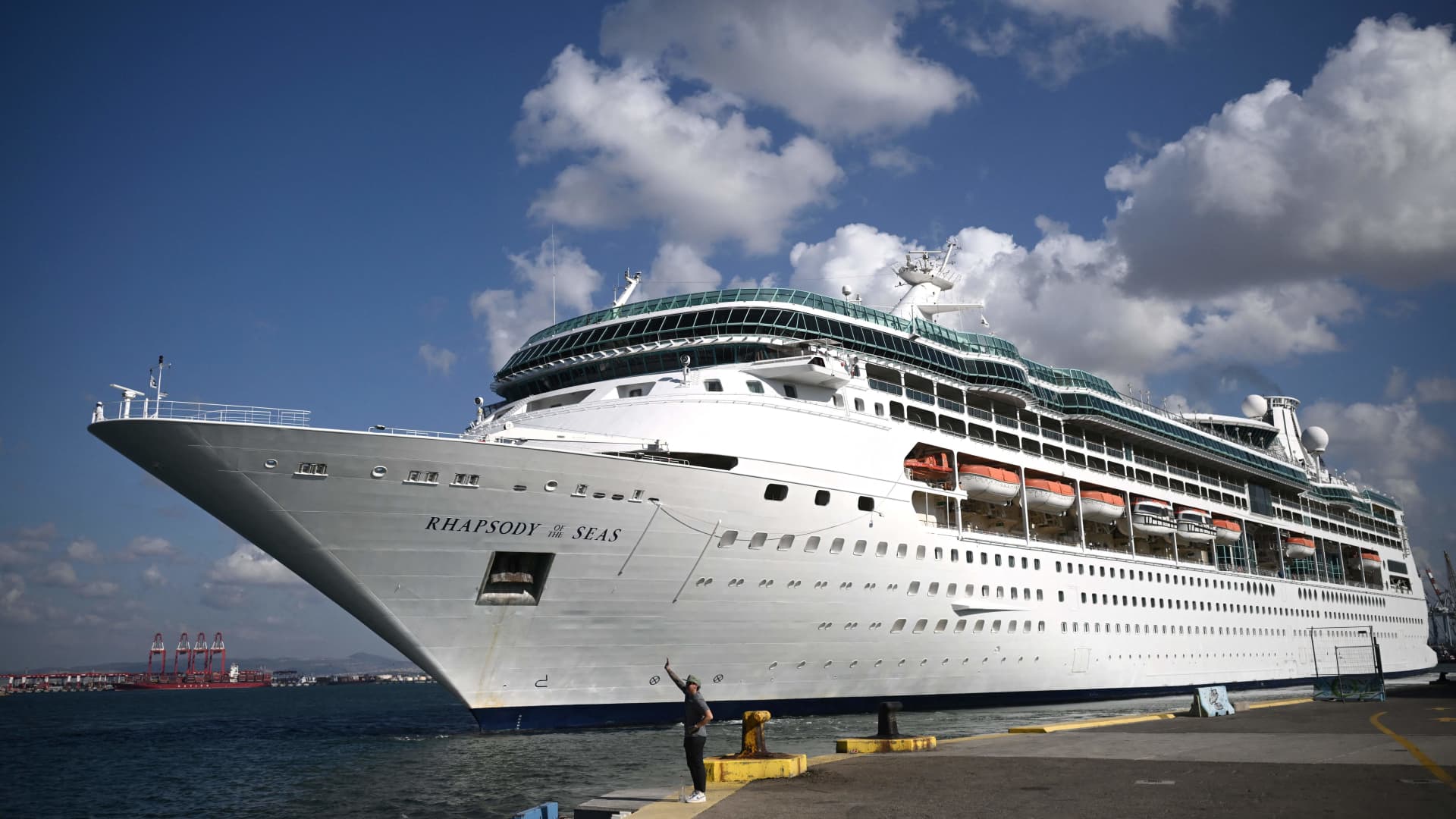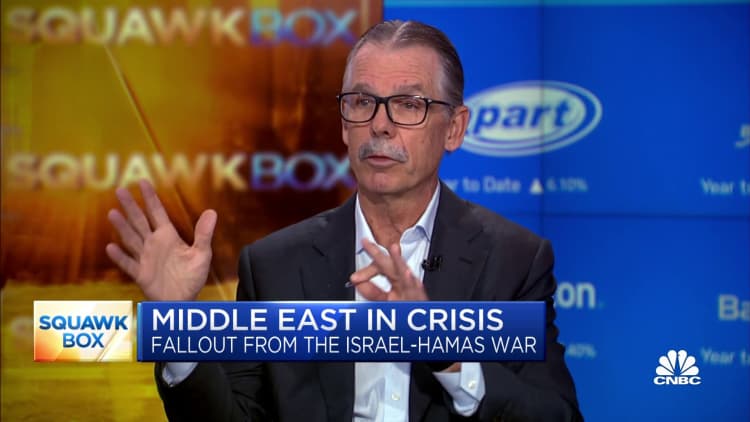The Israel-Hamas war is affecting the financial outlooks of these large companies


The ‘Rhapsody of the Seas’ cruise liner carrying US citizens leaves the Israeli port of Haifa to be evacuated to the Mediterranean island of Cyprus on October 16, 2023, amid the ongoing battles between Israel and the Palestinian Islamist group Hamas.
Aris Messinis | AFP | Getty Images
Some of the world’s most well-known companies are already seeing the Israel-Hamas war weighing on operations.
On Oct. 7, militant group Hamas struck Israeli towns in a surprise attack and took more than 200 hostages. More than 7,000 people have been killed in Gaza, per Palestinian health officials, while the Israeli Defense Forces said more than 1,400 have been killed in the country.
Corporations that do business or have operations in the region have already begun seeing the war change their financial outlooks as the unrest weighs on everything from advertising dollars to tourism to supply chains. These early admissions come as world leaders grow increasingly concerned that the conflict will further intensify, with international calls for a cease-fire being rejected.
United Airlines said fourth-quarter performance could vary depending on the length of flight suspensions in Tel Aviv. Its updated range for adjusted earnings per share came in below analysts’ forecasts.
“We have unmatched geographic diversity with a large domestic network complemented by the largest long-haul international network and both are solidly profitable,” CEO Scott Kirby said earlier this month. “While this is a great attribute, it does create some short-term risk and volatility as we’re seeing right now with the transitory hit to margins this quarter as a result of the tragedy in Israel.”
Travel changes
United is one of several carriers including Delta Air Lines and American Airlines that have rushed to change schedules as the conflict has unfolded. Notably, El Al, the Israeli flag carrier, said it would fly on the Jewish Sabbath for the first time in more than four decades to help bring reservists abroad back to the country.
Across the travel industry, the war is on the mind of corporate leaders. Plane-maker Boeing said in a regulatory filling that the conflict could potentially affect certain suppliers, in addition to airlines.
About 1.5% of Royal Caribbean capacity in the fourth quarter had planned to visit Israel, CEO Jason Liberty said on the cruise line’s call on Thursday. A few of the adjusted sailings that were previously expected have home ports in Haifa, a city in the northern region of the country.
The company also offered free use of its Rhapsody of the Seas vessel to the U.S. government to aid in the evacuation of Americans from Israel. Between the changed itineraries and use of the ship, the company estimated it would have an impact of 5 cents per share on its earnings. The company expects to see between $6.58 and $6.63 in adjusted earnings per share for the year.
El Al Airlines airplane flying on February 2023.
Nurphoto | Nurphoto | Getty Images
“I would … like to recognize the incredible effort from our shoreside teams and crew on board Rhapsody of the Seas who have been working tirelessly with the U.S. Department of State to help safely evacuate Americans from Israel,” Liberty said. “My heartfelt gratitude goes out to all involved.”
Still, Liberty said the cruise line’s customer base is sticky, so it may become more of a question of where they are going to travel rather than if they are going to cancel their plans.
“They’re going to go somewhere with us,” he said. “That’s what we’re focused on making sure they’re doing.”
‘Unpredictable nature’
Technology companies were among those seeing the conflict affect the workforce, advertising spending and supply chains.
Snap said in its latest earnings release that it saw pauses in spending from a “large number of primarily brand-oriented advertising campaigns” immediately after the war began. That has weighed on revenue quarter to date.
While the company said some of the campaigns that initially paused have now resumed, the company has also seen others that didn’t originally stop advertising now pause. Snap said it would be “imprudent” to offer formal guidance on what to expect for the current quarter “due to the unpredictable nature of war.”
Meta finance chief Susan Li said the Facebook and Instagram parent has seen softer advertising spending so far in the quarter, correlating in timeline with the start of the conflict. Li noted that it isn’t necessarily due to any one event, but cooler spending has aligned in the past with the start of conflicts such as the Russian invasion of Ukraine last year.
“This is something that we’re continuing to monitor,” Li told analysts during the company’s earnings call on Wednesday. “We’ve reflected the latest trends and advertiser reaction that we’ve seen into our Q4 outlook — which, again, we think reflects the greater uncertainty and volatility in the landscape ahead.”
Align Technology is expecting increased headwinds from the uncertainty and potential supply chain issues tied to the conflict, according to Chief Financial Officer John Morici. He said the fourth-quarter operating margin, when adjusted for generally accepted accounting principles, should be down from the prior quarter as the company offers severance to adjust to headcount changes in this situation.
Multiple corporations including Aon and West Pharmaceutical noted a continued focus on supporting employees and their family members who live and work in the region. Israel is known in part for its vibrant startup and technology scene, with entrepreneurs now wondering how to push forward in the new normal, especially as citizens get called to serve in reserve units.
ServiceNow CEO William McDermott said during the company’s call with analysts on Wednesday that employee Shlomi Sividia was among those murdered at the Supernova Music Festival. He said Sividia was “highly respected, admired and a good friend to many.”
“We stand in solidarity with our team and with their families. Terrorism has caused the unfathomable humanitarian crisis that now engulfs millions of people in Israel and Gaza,” McDermott said. “Our hearts pray for the innocent on all sides. Even with optimism in short supply, we choose to honor the dream of a peaceful and prosperous future for the Middle East region.”
Companies specializing in defense have also been on alert as another international conflict breaks out.
General Dynamics, the biggest U.S. artillery shell producer, had already been ramping up artillery production to meet needs amid the war in Ukraine, according to finance chief Jason Aiken. Now, the company is working to increase production to as high as 100,000 units per month, up from 14,000.
“I think the Israel situation is only going to put upward pressure on that demand,” Aiken said during General Dynamics’ Wednesday earnings call.
— CNBC’s Robert Hum, Morgan Brennan and Leslie Josephs contributed reporting.









